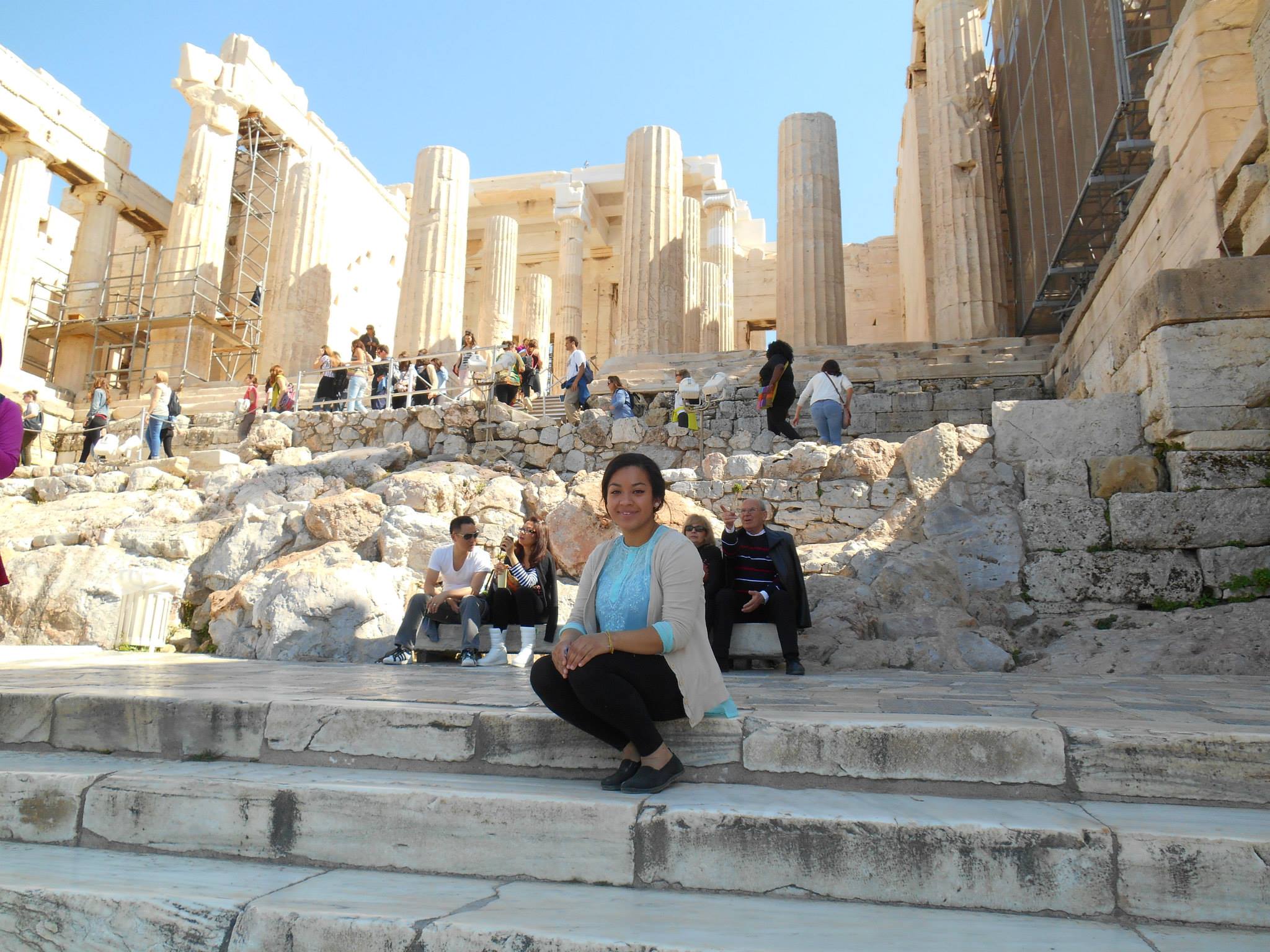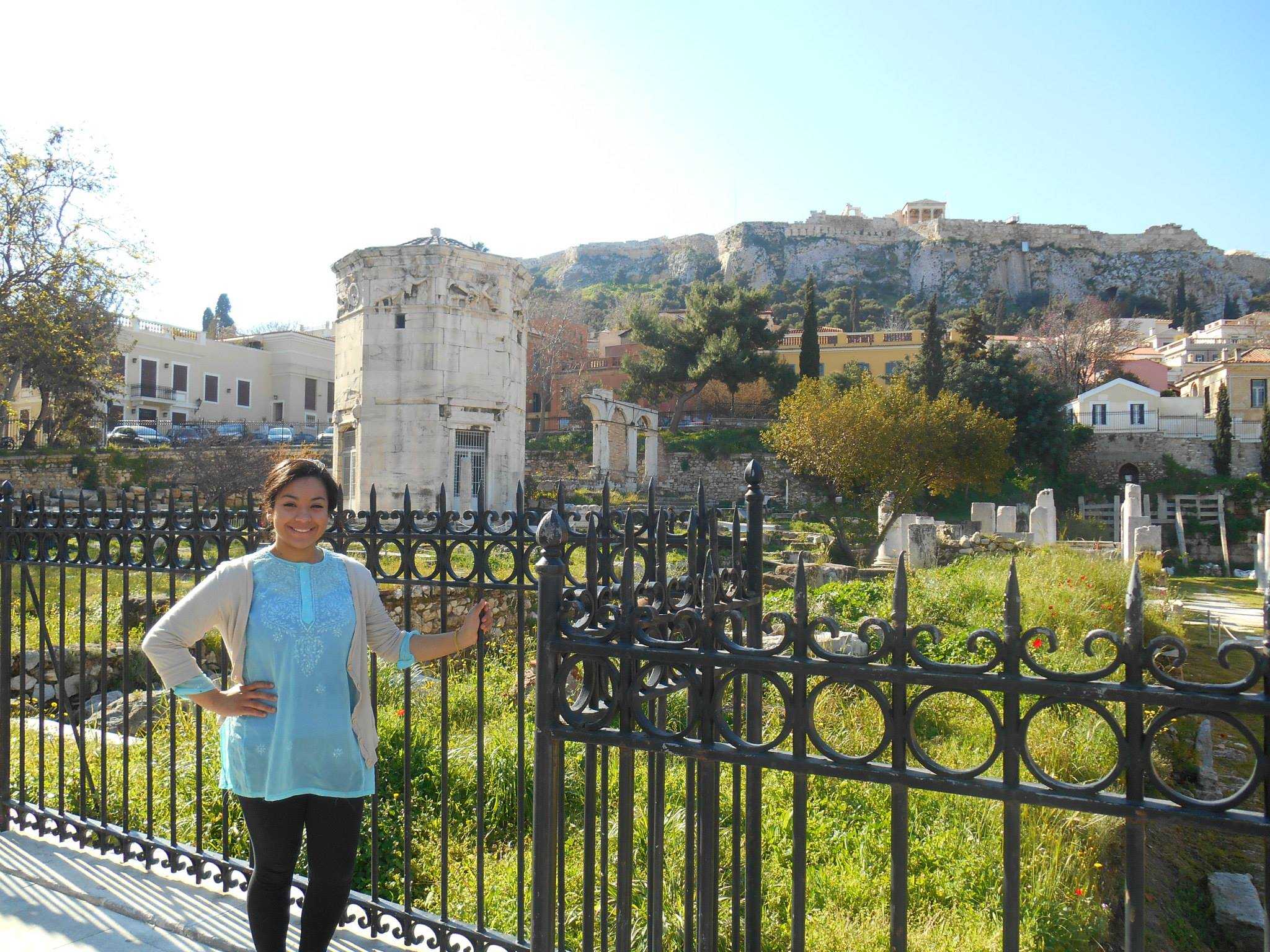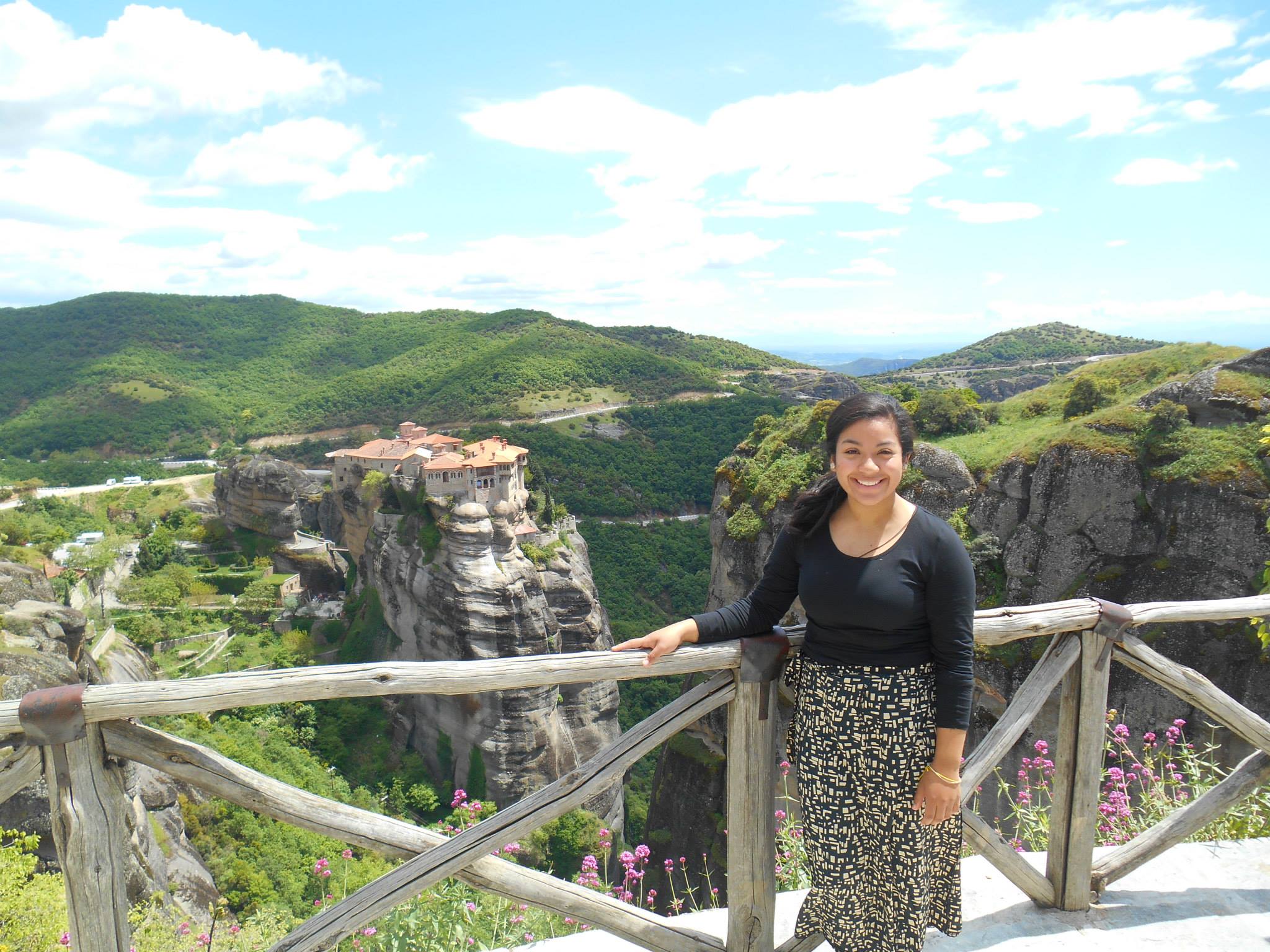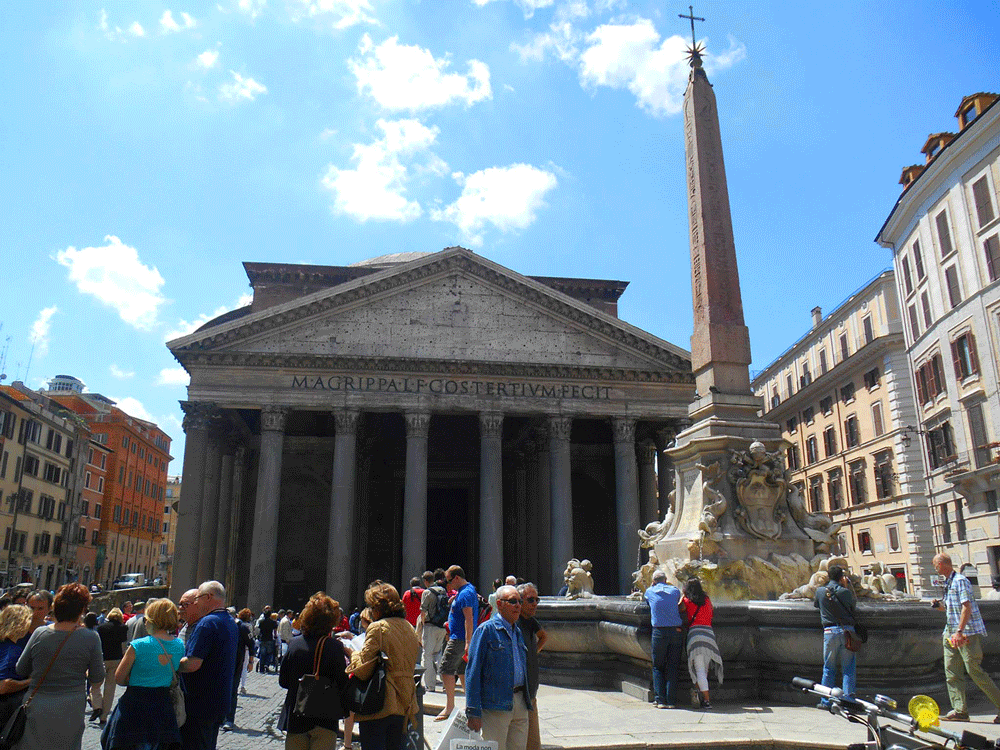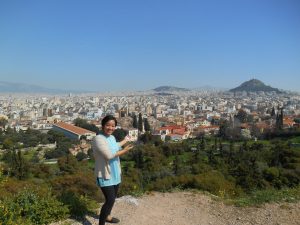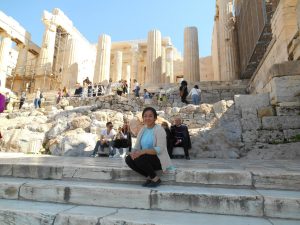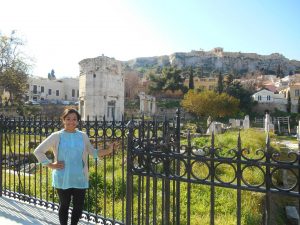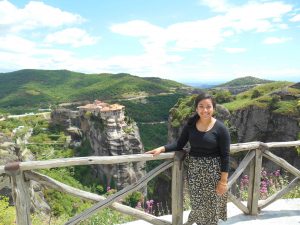Bitten by the travel bug
Studies show students benefit from travel abroad programs
April 29, 2015
If you’ve ever seen “The Breakfast Club,” you’ve seen the powerful connection formed by six dysfunctional teens in an eight-hour session of detention.
If you’ve ever studied abroad you’ll know that you make that same connection with your fellow travelers and host country within a week, month or semester of turning the world into your classroom… or in this comparison, the best detention a kid could ask for.
Wayne State College offers several of these unique opportunities that range from meddling in the Mediterranean with the semester abroad in Greece, untamed in Taiwan with a semester in Asia, or even a month in the rainforests of Costa Rica or the cobblestone streets of Spain for language immersion.
As well as two service-learning trips that are currently in the works, and will be unveiled within the next year or two.
“I’ve taken students abroad to several countries including the Czech Republic (3 times), Taiwan (2 times), China (3 times), Jordan (more than 20 times), Egypt, and Israel, and several countries in Europe,” professor of anthropology/sociology Susan Ellis said.
“Traveling is important for personal growth and to help students understand how others live and think.”
All of these programs are designed to meet the needs of students from any major who wish to reap the benefits of studying overseas.
Every single journey abroad meets the standards established by the International Education Policies Committee, that include being affordable, offering college credits and assurance of being led by Wayne State faculty based on their specific talents and experiences abroad.
In preparation for the big departure, the programs hold an orientation day to answer frequently asked questions and concerns from students and parents. Gerald and Kathleen Conway are in charge of mainly the Greece semester abroad and have been for many years.
“The meeting they have with the parents is open and frank and the Conways expertise and wisdom in traveling abroad answered a lot of our questions,” assistant registrar and parent to student traveler, Karla Hix said. “They stressed that they are not babysitters, but it is obvious they care deeply about all who were with them.”
According to Hix, her son would stay in touch via Skype and also through Facebook updates. She giggled at the fact that her son called more frequently during the end of the trip when he was running out of funds.
“But every time I talked to him, he sounded so happy and thrilled to be there, that it made us feel more comfortable,” Hix said.
Faculty receive a storm of inquiries ranging from pick pocketing, cell phones, classes abroad, converting U.S. dollars into another currency and just exactly how much is enough to bring during a lengthy amount of time.
“That is probably one of, if not the most, asked question,” WSC International program director Gerald Conway said. “Think of it this way. If you consider yourself to be a big spender here, then you are going to crank up your spending by a lot more while you’re abroad.”
Many students who have previously traveled to countries such as Taiwan, Greece or China had never stepped foot outside of the United States. Gaining the courage to leave everything behind is one of the first big obstacles.
“Some obstacles I’ve had to cross were financial needs for sure. Last summer I had to work two jobs in Wayne to save up for the tuition alone. Another obstacle was leaving my family and my dog,” junior Maxwell Honig said. “It’s going to be rough being apart from them for so long, definitely my dog, but the pros of this trip definitely outweigh the cons.”
While abroad, students experience cultural differences such as differences in food, appearances and personal habits. This kind of exposure allows students to understand where other cultures are coming from and even gain insight into their own culture.
“Greece is the most relaxed place! It’s crazy to sit and drink one coffee for three hours. Our group has really noticed slang words and expressions. We struggled with the alphabet and common phrases, but I love the longer you are here the more you learn,” junior Danielle Milburn said. “Oh, and the hardest thing? Trying to study and do homework while being in such a beautiful place!”
A person’s culture reflects very deep perceptions, beliefs, and values that influence his or her way of life and the way that she or he views the world.
“I think its pretty neat how happy they are. A lot of people here aren’t wealthy by any means and just have enough to get by, yet they are super happy and are always happy to help you,” Honig said.
On one particular Sunday, Milburn commented that a few of them had gone to church one morning and the locals were very kind and sincere as they handed them headphones and translated that Sunday’s reading for them. They had even invited WSC students to lunch the following Tuesday.
“They just love people and value time spent with friends,” Milburn said. “The world is beautiful, it’s so easy to see God here through nature. The world is also not perfect, Greece is struggling in many ways but people are still smiling. It’s crazy to think I was raised in Nebraska and I could have been Greek and everything here would be normal.”
Apart from the Greece semester abroad, language imersion trips are also offered. Spain and Costa Rica are a month long, and the Asia semester abroad started in the Spring of 2013, taking students to explore Taiwan and China and learn the Mandarin language.
Natalie Ribeiro, currently on the semester abroad in Asia, says that she has experienced a lot of culture shock since she’s been out in the Far East.
“I think what surprised me the most is how much influence the western culture has in Taiwan. The music, the clothes, technology, everything is pretty much the same,” Ribeiro said. “The food is very different. They eat rice for every meal pretty much and they love fried food, especially chicken. Mcdonald’s, KFC and Pizza Hut are very popular here and they deliver 24 hours a day.”
According to Ribiero, learning the Mandarin language has been very difficult. Even though a large portion of Asia can speak English, older generations are still learning and therefore making things like ordering at restaurants a small challenge for student travelers.
“They are never rude to us though, and they try to help as much as they can,” Ribiero said. “I have learned a lot since I’ve been here. Mostly about myself, but also about the importance of being patient and understanding others and their beliefs and way of life.”
Also in the works at Wayne State, is a service-learning trip that will take students to either enchanting Ethiopia or the foothills of the Himalayas in Nepal.
Underdeveloped countries like the aforementioned are widely misunderstood and understudied, so professor of exercise science, Barbara Engebretsen, and director of the Multicultural center, Leah Keino, are looking to bring students
and faculty along.
“Whatever we decide, we don’t want to go someplace and have them be only our host,” Engebretsen said. “We want them to tell us how having our students and faculty there will make them stronger too. We’re looking for mutual benefits.”
The Ethiopia/Nepal service learning trips will be taking students in the spring of 2017. As of right now, Nepal is still recovering from its recent earthquake and people everywhere are looking for ways to help.
“I’ve heard back from all our friends and connections in Nepal, thankfully they are all safe. However, I haven’t heard back from our medical friends or doctors that we met, they are probably busy helping out,” Engebretsen said. “We hope everyone is okay, and they know we are here if they need anything.”
To learn more on the service learning trip to Ethiopia/Nepal, Engebretsen will be giving a talk on Thurday, April 30, from 7 to 8 p.m. at the Laurel Community Center.
Aside from that, world traveler and explorer Dean Jacobs is also looking to take a few students on a service learning trip of his own to Ecuador and the Amazon in May or June of 2016.
“Jacobs graduated from WSC in Biology and has been coming back to Wayne to give talks on his travels,” service-learning coordinator Lisa Nelson said. “Originally, he worked for a big corporation, but felt like something was missing. He had always dreamed of traveling the world and so one day he sold his house and took off.”
The Ecuador trip will possibly be a hybrid course of 3-5 weeks long, some homework will be online and some meetings will be in person, while 10 days will be spent in Ecuador. Providing students a total of 9 credit hours.
“Dean wants to provide a win-win situation and take students to a village in Ecuador to provide learning opportunities for the Achuar people. They’ll learn from us, we’ll learn from them,” Nelson said. “We haven’t had any international service-learning trips like this or Ethiopia/Nepal, so this will be unique to WSC.”
After studying abroad, one of the biggest things that travelers come to realize is the plethora of opportunity that is presented to us in the United States that sometimes U.S. citizens take for granted.
“While being in Greece, I’ve noticed that Greeks are really smart, but don’t have a lot of opportunities to show it. They’re multilingual and go to school to be the best they can be, but because their economy is so bad they have to settle for what they can get,” sophomore Sarayh Gutierrez said. “It upsets me because living in America I feel we have so many opportunities and many times we don’t take advantage of them. I wish everyone else could see how the rest of the world is doing so they know how good we have it back home.”
Gutierrez says that traveling has opened up her eyes and sparked the desire to want to keep up with the news and current world events.
“I never hear anything about any other country unless it is pertaining to the U.S, and its saddening because I come here and the Greeks know so much about American culture,” Gutierrez said.
Students also found that learning a new language, interacting with people from different cultures and seeing historical monuments and architecture changed them in ways they never imagined.
“The idea of different languages means something totally different to me now than it used to. Language barriers are such a real thing and make everyday interactions an ordeal,” sophomore Matt Mullins said. “I also see the world as a much bigger place, it is one thing to think about how many places there are on the world—but seeing them for yourself is something I would recommend to anyone. Coming back to the states I feel as though I will be more appreciative of luxuries that we as Americans commonly take for granted.”
The Journal of Studies in International Education reports that 96 percent have increased self-confidence, 97 percent feel more mature and 98 percent understand their own values more clearly.
The world continues to become more globalized, yet only 2 percent of U.S. undergraduate students ever experience a semester abroad.
The experience certainly sets an individual apart from the crowd. It demonstrates to future employers one’s ability in negotiating with another culture and willingness to try new things.
Students who study abroad return with a new view of the world, a view that helps them better understand the nature of differences but also the degree of sameness. A view that also helps them see what direction they want to take their life in and better understand themselves.
“Do you think they would let me take the mountains or the sea home? It is beautiful here. Looking out my balcony every morning I get to see snowcapped mountains, then in the afternoon when the sun comes up, you can bet that we will be down by the water just messing around,” Mullins said.
Mullins comments that every person the group has met along the way has been extremely hospitable and generous. One man in particular stood out to them during the Greek Independence Day parade.
“There was an older Greek gentleman in front of us who overheard us talking in English behind him. He turned around and asked us if we were Dutch, to which we replied, ‘No, American’. At that moment the man turned around and started getting people out of the way so we could have a perfect view and enjoy their beautiful parade.”
So if you feel something pulling at you, calling your name, asking you to go—answer that call. It might just be that irresistible desire to travel and understand one’s very own existence, and you will certainly find answers once you take that leap.
If it’s one thing I know, it’s that.









